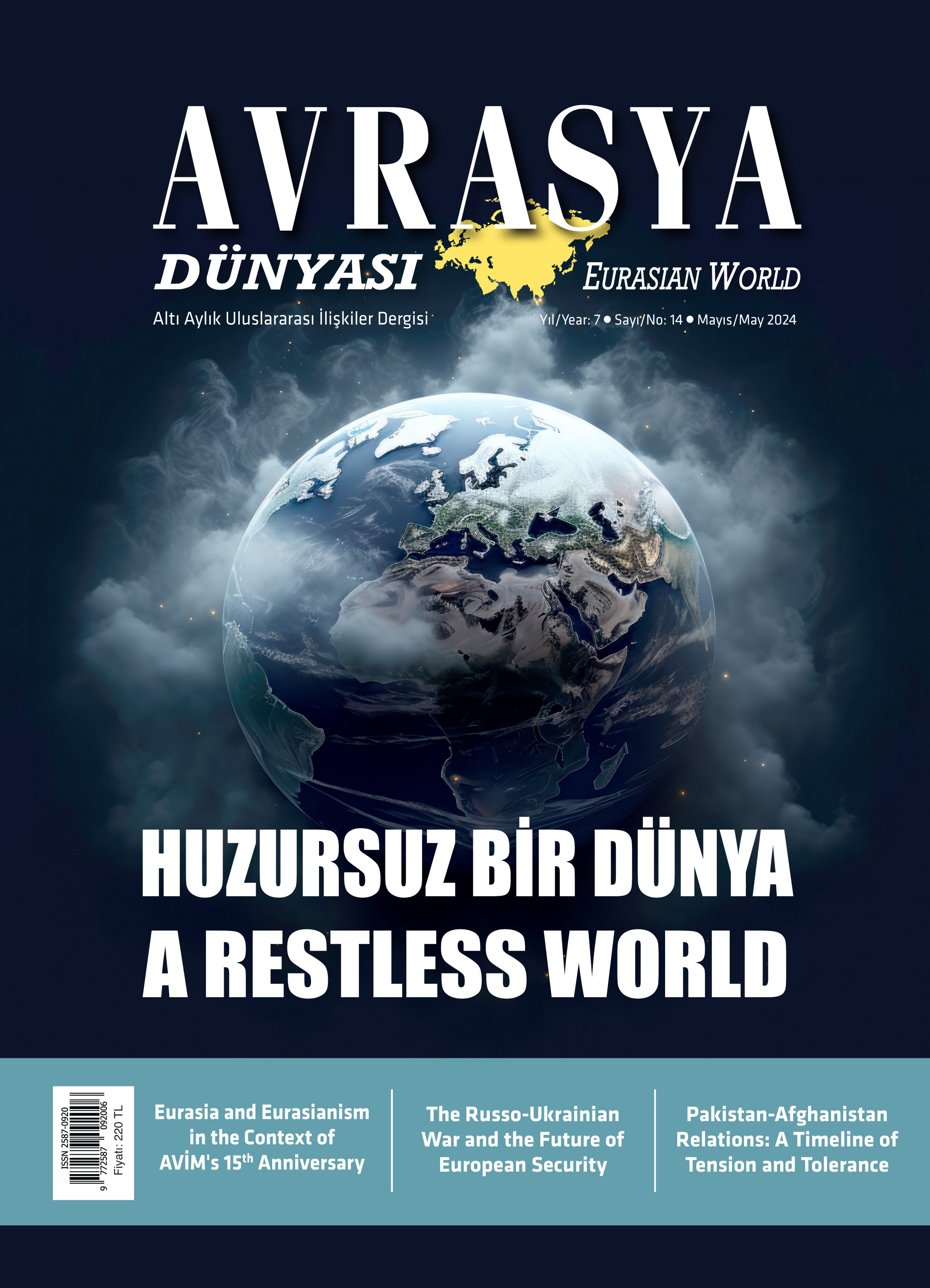The first issue of the Eurasian World journal of every year coincides with the spring season. We firmly hope that this time of the year, accompanied by a spring-like rejuvenation will bring peace, tranquility, and, mutual empathy for humanity. Such expectations are unfortunately rarely fulfilled, and sometimes we are met with nasty surprises, such as the outbreak of the Russia-Ukraine war in February 2022 when the spring flowers were just beginning to bud.
So, how does the Center for Eurasian Studies (AVİM) see the world political landscape in the spring of 2024? Our answer is not far away; it is right on the cover of this issue. A restless world!
Why have we chosen this description? It is enough to take a look at what is happening in our storied world to find the answer to this question. In the context of the post-Cold War era, a war that until a few years ago was considered a far-fetched possibility, namely Russia's attack on Ukraine, broke out in the heart of Europe, the old continent that was supposed to be at peace after two major world wars and a long Cold War. This war between Russia and Ukraine continues and it is unknown when it will end. Moreover, the fact that one of the parties to this war has nuclear weapons seems to have brought back the fears of the Cold War days. Unfortunately, the current uneasiness does not stop there. The fact that the Russian Federation officials see the Black Sea as a complementary part of their goals increases the likelihood that the Russia-Ukraine war will spread around the Black Sea.
The atmosphere of anxiety and fear, which does not suit the spring season, is also present in other regions. The sudden and horrifying attack launched by Hamas against Israel on 7 October last year, Israel's highly disproportionate response, Iran's -thankfully- brief airstrikes in support of Hamas and to save face, and then Israel's airstrikes against Iran, which were stalled for about two weeks after Israel was placed under heavy pressure. As hopes for a ceasefire in the region fade, the human toll is alarming, with more than 30,000 Palestinians killed and 75,000 wounded.
In Yemen, the drone and rocket attacks launched by the Houthis against civilian merchant ships to seize the control of the Bab-el-Mandeb Strait continue under the new justification of support for the Palestinian cause.
These wars and conflicts, which seem to be intertwined with each other, take place on an axis stretching from Eastern Europe to the south of Western Asia. Unfortunately, this is not the only threat to global peace. There is no good news from the Pacific either. The greatest power in the region claims some archipelagos and territorial jurisdictions in both the East China and South China Seas. It carries out a military show-off in a maritime region running from north to south, creating artificial islands where necessary. Of course, these activities do not remain without a repercussion. A chain of countries led by the United States, starting with Japan and South Korea, and extending to East Asian countries, is increasing in solidarity for countermeasures. Since the region is essentially the Pacific Ocean, warships, submarines and airplanes are close and intertwined enough to spark a conflict at any moment. In short, this region is also ready to explode at any moment.
At the risk of making the above dark picture a little darker, we can also mention North Korea's increasingly rapid development of nuclear weapons, and ballistic, supersonic, and hypersonic missiles accompanied by utterings of militaristic slogans in the Pacific. Certainly, one can neither ignore the bloody operation under taken by Myanmar government against the Rohingya population of the country.
Finally, one should not overlook the efforts that the leading countries such as the United States, Russia, and China, as well as the countries of the Global South such as Iran and some Arab countries, seem to have undertaken ititiatives, especially after France reduced its presence in the region, to penetrate the African continent as another emerging source of unrest.
In conclusion, one is nevertheless trying to be optimistic and hopeful that, at least for the remaining part of the year 2024, the wars will stop, the current problems will end without leading to a war, and humanity will reach the days of peace and tranquility that it has long deserved.
“Eurasia and Eurasianism in the Context of AVİM's 15th Anniversary,” Dr. Teoman Ertuğrul Tulun
“The Russo-Ukrainian War and the Future of European Security,” István Íjgyártó
“Central Europe after the War in Ukraine: Conclusions and Expectations,” Dr. Jakub Korejba
“Relations of Hungary and Ukraine through the lens of Transcarpathia,” Dr. Sandor Seremet
“Georgia’s Geopolitical Crossroads: Adapting to New Realities in the Aftermath of the Russo-Ukrainian Conflict,” Tamara Urošević
“Strengthening Relations between the Republic of Serbia and the EU through the Prism of Cooperation with the Ministry of Defense and the Serbian Armed Forces,” Jelena Andjelkovic
“Pakistan - Afghanistan Relations: A Timeline of Tension and Tolerance,” Hossein Ebrahim Khani
Dr. Teoman Ertuğrul Tulun (Analyst, Center For Eurasian Studies (AVİM))
István Íjgyártó (Chief Advisor, Hungarian Institute of International Affairs; Former Ambassador of Hungary to Bucharest (2000-2004), Moscow (2010-2014), and Kyiv (2018-2023))
Dr. Jakub Korejba (Non-Resident Fellow, Center for Eurasian Studies (AVİM))
Meszár Tárik (Researcher, Eurasia Center of John von Neumann University, Budapest, Hungary; Mathias Corvinus Collegium, Migration Research Institute, Budapest, Hungary)
Dr. Sandor Seremet (Researcher, Eurasia Center at the John von Neumann University, Budapest, Hungary; Senior Research Fellow, Hungarian Institute of International Affairs, Budapest, Hungary)
Tamara Urošević (International Security Manager Non Resident Associate, Center for Geostrategic research and terrorism (CeGRT), Belgrade, Serbia)
Jelena Andjelkovic (Researcher and Project Coordinator, Center for geostrategic research and terrorism (CeGRT), Belgrade, Serbia)
Hossein Ebrahim Khani (Retired Ambassador; Associate Fellow, Institute for Political and International Studies (IPIS), Tehran, Iran)


